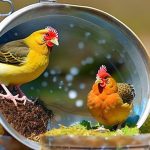Keeping chickens in a garden has become increasingly popular in recent years, as more people are looking for ways to live a more sustainable and self-sufficient lifestyle. Not only do chickens provide fresh eggs, but they also offer natural pest control and fertilizer for the garden. Additionally, they can be entertaining and provide companionship.
Personally, I have been keeping chickens in my garden for several years now and have found it to be a rewarding and enjoyable experience. Not only do I get to enjoy fresh eggs every day, but I also love watching the chickens roam around the garden and interact with each other. It has added a new level of life and vibrancy to my garden, and I wouldn’t trade it for anything.
Key Takeaways
- Keeping chickens in a garden can provide fresh eggs, natural pest control, and fertilizer for plants.
- Different breeds of chickens have different temperaments and egg-laying abilities, so choose carefully.
- Before bringing chickens into your garden, make sure to secure the area and provide shelter from predators.
- Building a chicken coop and run requires careful planning and consideration of the chickens’ needs.
- Proper feeding, watering, and healthcare are essential for keeping chickens healthy in a garden environment.
The benefits of keeping chickens in a garden
One of the main benefits of keeping chickens in a garden is the abundance of fresh eggs they provide. There is nothing quite like collecting eggs from your own backyard and knowing exactly where they came from. Not only are they delicious, but they are also packed with nutrients and have a richer flavor than store-bought eggs.
Another benefit of having chickens in the garden is their natural pest control abilities. Chickens love to eat insects, slugs, and other pests that can damage your plants. They will happily spend their days scratching and pecking at the ground, keeping your garden free from unwanted critters.
Chickens also provide an excellent source of fertilizer for your garden. Their droppings are rich in nitrogen, phosphorus, and potassium, which are essential nutrients for plant growth. By allowing your chickens to roam freely in your garden, they will naturally fertilize the soil as they go.
Lastly, keeping chickens in a garden can be incredibly entertaining and provide companionship. Chickens have unique personalities and watching them interact with each other can be highly entertaining. They can also be surprisingly affectionate and enjoy being held and petted. They can provide a sense of companionship and connection to nature that is hard to find elsewhere.
Choosing the right breed of chickens for your garden
When choosing chickens for your garden, there are several factors to consider. First, you’ll want to think about the size of the breed. If you have a small garden, you may want to choose smaller breeds that won’t take up too much space. On the other hand, if you have a large garden, you may opt for larger breeds that can roam more freely.
Temperament is another important factor to consider. Some breeds are more docile and friendly, while others can be more aggressive or flighty. If you have children or plan on interacting with your chickens frequently, you’ll want to choose a breed that is known for being friendly and easy to handle.
Egg-laying ability is also an important consideration. If you are primarily interested in having a steady supply of fresh eggs, you’ll want to choose breeds that are known for being prolific layers. Some popular egg-laying breeds include Rhode Island Reds, Leghorns, and Australorps.
Preparing your garden for chickens
Before bringing chickens into your garden, it’s important to make sure it is properly prepared for them. One of the first things you’ll want to do is install fencing to keep your chickens contained and protect them from predators. Make sure the fencing is secure and extends underground to prevent predators from digging under it.
You’ll also want to designate specific areas for your chickens to roam. This can be done by creating separate fenced-off areas or using movable chicken tractors. By rotating their access to different parts of the garden, you can prevent them from overgrazing or damaging specific areas.
To protect your plants and garden beds from being trampled or eaten by chickens, consider using chicken wire or other barriers around sensitive areas. You can also create raised beds or use containers to keep your plants out of reach.
Building a chicken coop and run in your garden
When it comes to building a chicken coop and run in your garden, you have the option of DIY or pre-made options. DIY coops can be more cost-effective and allow for customization, but they require more time and effort to build. Pre-made coops are convenient and often come with all the necessary features, but they can be more expensive.
When designing your chicken coop, consider the size and layout. Chickens need enough space to move around comfortably and have separate areas for nesting, roosting, and feeding. The coop should also have good ventilation and be easy to clean.
Materials needed for building a chicken coop include lumber, wire mesh, roofing materials, and hardware such as hinges and latches. Make sure to choose materials that are durable and weather-resistant to ensure the longevity of your coop.
Feeding and caring for your chickens in a garden

Proper nutrition and hydration are essential for keeping chickens healthy in a garden environment. Chickens require a balanced diet that includes a mix of grains, protein, fruits, vegetables, and calcium. You can purchase commercial chicken feed or create your own mix using ingredients such as corn, wheat, soybean meal, and oyster shells.
In addition to their regular diet, chickens also need access to fresh water at all times. Make sure to provide them with clean water in a container that is large enough for them to drink from without tipping over.
Caring for chickens in a garden involves daily tasks such as checking for eggs, refilling food and water containers, and cleaning the coop. It’s also important to regularly inspect your chickens for signs of illness or injury and provide any necessary medical care.
To keep your chickens happy and healthy, make sure they have plenty of space to roam and access to fresh air and sunlight. Provide them with enrichment activities such as perches, dust baths, and toys to keep them entertained.
Keeping your chickens healthy in a garden environment
While chickens are generally hardy animals, they can still be susceptible to certain health issues. Some common health problems in chickens include respiratory infections, parasites, and egg-laying issues. To prevent these issues, make sure to keep your coop clean and dry, provide regular veterinary care, and practice good biosecurity measures.
If your chickens do become sick, there are natural remedies that can help. For respiratory infections, you can use herbs such as oregano and thyme, which have antimicrobial properties. Diatomaceous earth can be used to control external parasites such as mites and lice. However, it’s important to consult with a veterinarian before using any natural remedies to ensure they are safe and effective.
If your chickens show signs of severe illness or injury, it’s important to seek veterinary care immediately. A veterinarian will be able to diagnose the issue and provide appropriate treatment.
Dealing with potential problems when keeping chickens in a garden
Keeping chickens in a garden can sometimes lead to noise and odor complaints from neighbors. To minimize these issues, make sure to keep your coop clean and well-maintained. Regularly clean out the coop and remove any accumulated waste. You can also use odor-absorbing materials such as straw or wood shavings to help control odors.
Predators and pests can also be a concern when keeping chickens in a garden. Make sure your coop is secure and predator-proof by using sturdy fencing and locks on doors and windows. Consider installing motion-activated lights or alarms to deter predators.
It’s also important to be aware of any legal considerations when keeping chickens in a garden. Some areas have restrictions on the number of chickens you can have or require permits for keeping them. Make sure to check with your local government or homeowner’s association to ensure you are in compliance with any regulations.
Harvesting eggs and other benefits of keeping chickens in a garden
Harvesting eggs from your chickens is a rewarding experience. Make sure to collect eggs daily to prevent them from getting dirty or being eaten by predators. Store eggs in a cool, dry place and use them within a few weeks for the best quality.
In addition to fresh eggs, keeping chickens in a garden provides other benefits. Chicken manure is an excellent source of fertilizer for your garden. It can be composted and used to enrich the soil, improving plant growth and productivity.
Keeping chickens also promotes self-sufficiency and reduces food waste. Chickens can eat kitchen scraps such as vegetable peels, fruit scraps, and bread, reducing the amount of food waste that goes into the landfill.
Conclusion and tips for successful chicken-keeping in a garden
Keeping chickens in a garden can be a rewarding and enjoyable experience. Not only do they provide fresh eggs, natural pest control, and fertilizer for the garden, but they also offer entertainment and companionship. By choosing the right breed, preparing your garden properly, and providing proper care and nutrition, you can have a successful chicken-keeping experience in your garden.
Remember to check with local regulations and consider the needs of your neighbors when keeping chickens. By being a responsible chicken owner and addressing any potential problems proactively, you can ensure a positive experience for both you and your chickens.
If you’re interested in learning more about keeping chickens in a garden, there are many resources available. Books, websites, and online forums can provide valuable information and support for new chicken owners. Additionally, consider joining a local chicken-keeping group or attending workshops or classes to learn from experienced chicken owners.
In conclusion, keeping chickens in a garden can be a wonderful addition to any backyard. Not only do they provide fresh eggs and natural pest control, but they also offer entertainment and companionship. By following the tips and guidelines outlined in this article, you can have a successful and rewarding chicken-keeping experience in your garden.
If you’re considering keeping chickens in your garden, you may also be interested in learning about what vegetables quails eat. Quails are small birds that can be a great addition to your backyard flock. They have specific dietary needs, and knowing which vegetables they can consume is essential for their health and well-being. To find out more about the vegetables that quails can eat, check out this informative article on Poultry Wizard: What Vegetables Do Quails Eat? While you’re there, don’t forget to explore Poultry Wizard’s website for more valuable information on keeping chickens and other poultry-related topics. You might also find their article on chicken coop door size helpful: Chicken Coop Door Size.
FAQs
What are the benefits of keeping chickens in a garden?
Keeping chickens in a garden can provide fresh eggs, natural pest control, and fertilizer for the garden. They can also be entertaining pets and can help teach children about responsibility and animal care.
What are the legal requirements for keeping chickens in a garden?
The legal requirements for keeping chickens in a garden vary depending on the location. It is important to check with local authorities to determine if there are any zoning or permit requirements. Some areas may have restrictions on the number of chickens allowed or require specific coop and fencing requirements.
What kind of space do chickens need in a garden?
Chickens need a minimum of 4 square feet of space per bird in their coop and at least 10 square feet of outdoor space per bird. It is important to provide a secure coop and fenced outdoor area to protect the chickens from predators.
What do chickens eat and how do you care for them?
Chickens eat a variety of foods including chicken feed, grains, fruits, and vegetables. They also need access to clean water at all times. Chickens require daily care including cleaning their coop, providing fresh food and water, and collecting eggs.
What are the potential drawbacks of keeping chickens in a garden?
Potential drawbacks of keeping chickens in a garden include noise, odor, and the potential for attracting predators. Chickens can also damage garden plants if they are allowed to free-range in the garden. It is important to consider these factors before deciding to keep chickens in a garden.
Meet Walter, the feathered-friend fanatic of Florida! Nestled in the sunshine state, Walter struts through life with his feathered companions, clucking his way to happiness. With a coop that’s fancier than a five-star hotel, he’s the Don Juan of the chicken world. When he’s not teaching his hens to do the cha-cha, you’ll find him in a heated debate with his prized rooster, Sir Clucks-a-Lot. Walter’s poultry passion is no yolk; he’s the sunny-side-up guy you never knew you needed in your flock of friends!







